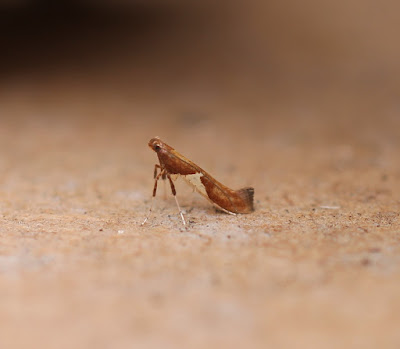 |
| Northern Spinach (Eulithis populata) |
If you look closely, the two lines enclose a row of tightly linked round cells that resemble microscopic images of plant epidermis. Diagonal apical streaks and inconspicuous vein marks are also seen. The tip of the abdomen is raised. Bilberry is the foodplant, on which they can sometimes be found after dark - the name populata or poplar is incorrectly given as the foodplant.
The second moth on this post was caught earlier in the month and has just been confirmed by Charlie Fletcher as a Caloptilia stigmatella. It rests with its forelegs almost at right angles with its body and its head highly raised – ‘phalakasana’, if you do yoga. Also notable is the long antennae brushed back to trace the length of the whole body and the sharp tornal angle. The ground color is a rich reddish brown, with a triangular white patch in the middle.
 |
| (Caloptilia stigmatella) |
The name comes from ‘kalos’, the Greek for beautiful, and ‘ptilon’, meaning feather or wing; the name giver was probably impressed with the neatly colored wing. Stigmatus, or marked, refers to the white patch.
Post: Tung Chau (UPenn)
Post: Tung Chau (UPenn)
